Last month, we parted with our Coleman Taos popup camper and invested in a Forest River Cherokee Wolf Pup travel trailer. Some may say we crossed over to the “dark side.” While we were sad to see Jim Bob go, we are definitely happy to have something a little more substantial, both in structure and roominess.
That doesn’t mean there aren’t things about our popup that we don’t miss. Every camper has it’s pro’s and con’s. For those of you who are considering making a change, here are some of the observations we’ve had since moving from a popup to a travel trailer.
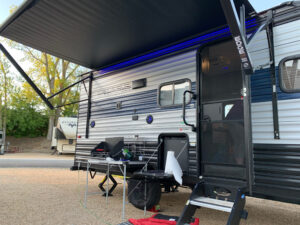
BENEFITS OF A TRAVEL TRAILER
- More space – Anyone who has camped in a popup, especially a smaller one, knows that space is at a premium. With the Taos, you essentially get room to walk in the door and make a 360 turn in place. Sure, there’s a dinette, but once that’s folded down into a bed, your standing room inside is basically 4’x4′ square. In our Wolf Pup, while space is still somewhat limited, we at least have room for people to move around inside.
- More storage – This was a big one for us, as we have five people to account for on our trips. That means lots of clothes, lots of food, and lots of activities. Just packing our folding chairs in the popup proved to be a challenge at times, mainly because we have to be able to drop and lock the room in place. This meant that a lot of our items we camped with were usually stuffed into the car with us. With the Wolf Pup, we have dedicated storage in both the front and rear of the camper for tools, supplies, chairs, and even bikes, as well as a fridge that we can run on 12V power, so it can stay on while traveling down the road to keep food cool. Clothes bags can be placed on the bunks, so our car actually has room again!
- Self-Contained – The first night we took our Taos out camping, we discovered the biggest downfall: a lack of a bathroom. The campground in which we were staying locked their bath houses at night due to COVID. I won’t tell you how we improvised, other than to say we improvised… On the Wolf Pup, we have a bathroom with a shower, and a freshwater tank, so we can be entirely self-contained if we so choose.
- Weather Resistant – With a popup, you are essentially staying in a tent on wheels. This means that whatever the temperature is outside, you can expect it to be pretty much the same inside. We were able to get by with an electric heater on cooler nights, but in the summer, it was a struggle to keep cool. In our travel trailer, we have both a propane furnace and an AC unit, so temperature control isn’t as big of a deal.
- Sleeping space – Our Wolf Pup is the 16BHS, which means it’s a bunkhouse model that has a master queen bed as well as two single bunks plus a fold-down dinette, which gives all three of our boys a place to sleep. In the popup, two of our boys shared one bunk, while our oldest usually opted to sleep in a tent next to us to get more room.
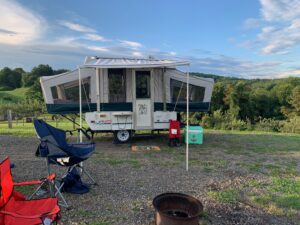
BENEFITS OF A POP-UP
- Parking – This was our first realization when getting the Wolf Pup. The popup could easily be backed into our garage, and once inside, could open up fully, so we could do whatever work we wanted on it and even store it for the winter without any additional cost. Not so with the travel trailer. We had to book an outdoor storage facility, as the trailer was never going to fit in our residential garage. Since our house sits on a hill, we also have no level ground on which to park it, so we have to keep it parked a couple miles down the road.
- Portability – Don’t let anyone tell you otherwise; size matters! While we were a little too close for comfort at times inside the popup, when it came to towing and parking, it was very much a piece of cake. You can easily see over the top of the camper through the rear window, It’s also light enough to be able to move manually, which means that you can get it generally where you want it with the tow vehicle, disconnect it, and move it by hand into place. This is especially nice when camping with others, as you can easily turn the camper around to face your neighbor.
- No Tanks – While the lack of a bathroom in and of itself can be an inconvenience, there is something to be said for not having to visit a dump station on your way out of a camp site. With no black or grey water to worry about, you’re set to go. You also don’t have to worry about cleaning, draining, or winterizing (unless you use the direct water line, which we never did). This does affect your ability to boondock, however….
- Gas Mileage – As we watch gas prices soar into the stratosphere, this may be a make-or-break decision when it comes to a pop-up over a travel trailer. Towing our pop-up, we saw very little fluctuation in our gas mileage; once we started towing a travel trailer, though, our mileage took a MAJOR hit due to the weight and overall size.
- Repairs – with a popup, there are fewer points of failure, which means they typically are easier to repair when something does go wrong. If you see something not working, it’s not hard to figure out why. On a travel trailer, the more options you have, the more possibilities you have if something isn’t right.
TOSS UP ROUND
- Boondocking – Points to the travel trailer for being self-contained, although with a pack of bottled water and a deep cycle marine battery, one could boondock in a popup. Just plan on bringing a portable cassette toilet.
- Cooking/Food Prep – Our popup had a two-burner propane stove that could be used inside or outside (we used it exclusively outside). Our travel trailer has a two-burner propane stove inside, and we have a portable propane camping stove. Since getting the travel trailer, we’ve continued to keep our cooking outside as much as possible. Virtually no difference.
- Electric/Power – Both campers had deep cycle marine batteries that would power overhead lights, and both had 30-amp electric hookups that would also power outlets. A slight edge goes to the Wolf Pup, though, for including a 12V refridgerator, as well as 12V USB ports, so even on battery, we have more than just overhead lights.
- Value – Right now, we are in the midst of a large camping boom in North America. That means that campers are often holding their value over time (with some actually increasing in value). This is true for all types of campers and RV’s at the moment.
WHICH IS BEST FOR ME?
As you can see, there really are positives and negatives for both types of campers. It really does come down to what your own personal needs and preferences are. If you want something that is easy to tow, low maintenance, and doesn’t need a lot of space, then a popup would be just fine. If you are a family with teens or pre-teens, or want something a little more self-contained, then a travel trailer would probably be a better option.
If you are new to camping, then our personal recommendation would definitely be to start with a popup camper. Not only will the financial investment often be lower (especially if you are buying a used camper), but if you are not sure whether camping is for you, having a popup will help you decide rather quickly. In our case, we learned how to adapt with fewer conveniences to the point that, when we did finally switch to a travel trailer, we appreciated more the “luxuries” that came with it. We also knew how to improvise if something went wrong. Think of it as learning how to drive; you want to get the basics down on a regular car before you go racing in a hot rod.
Of course, these are our own recommendations based on our personal experience. Your circumstances may be totally different than ours! We’d love to hear what your experiences have been. Do you agree or disagree? Let us know in the comments below!
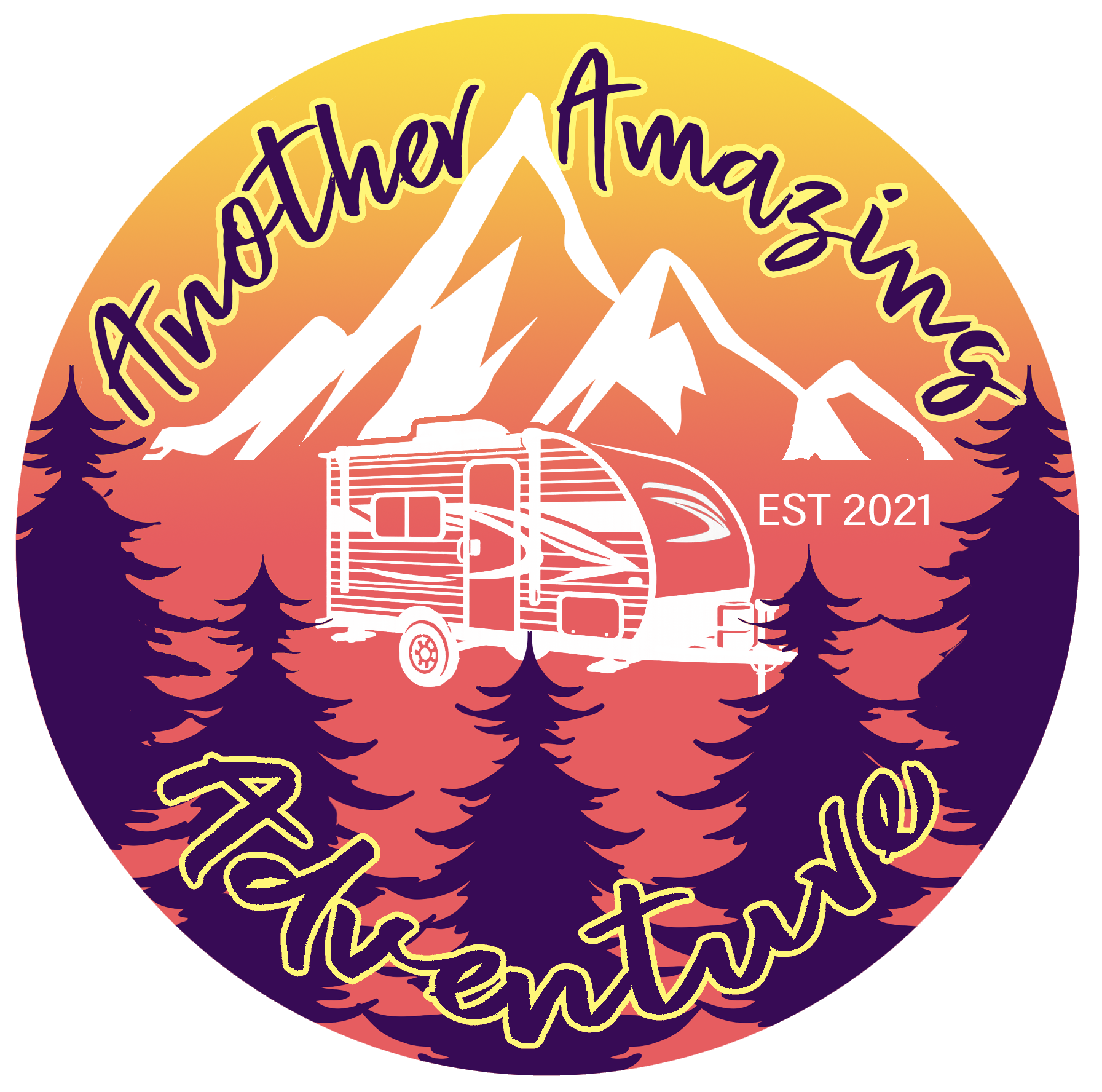
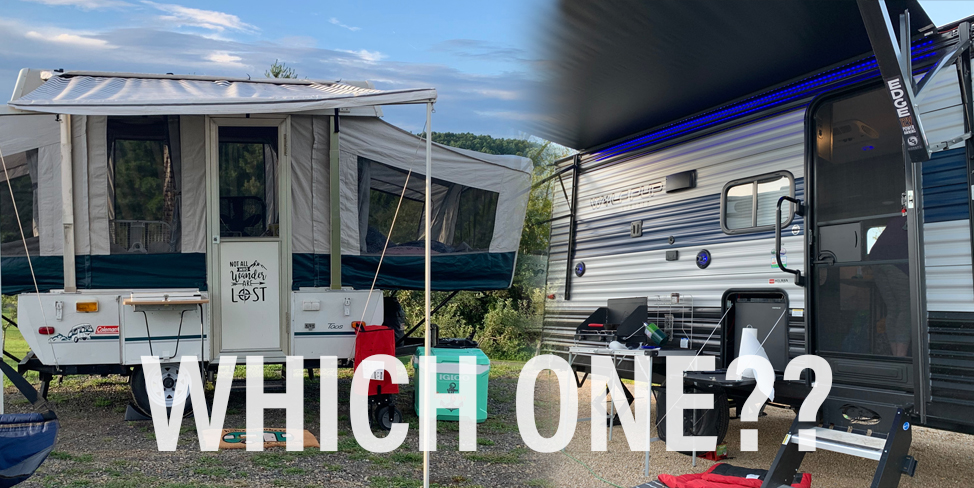
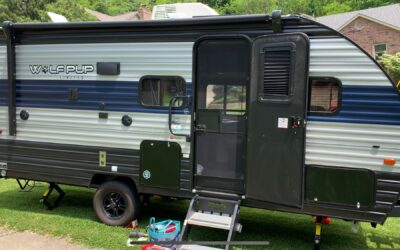
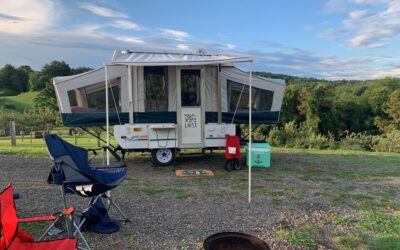
0 Comments